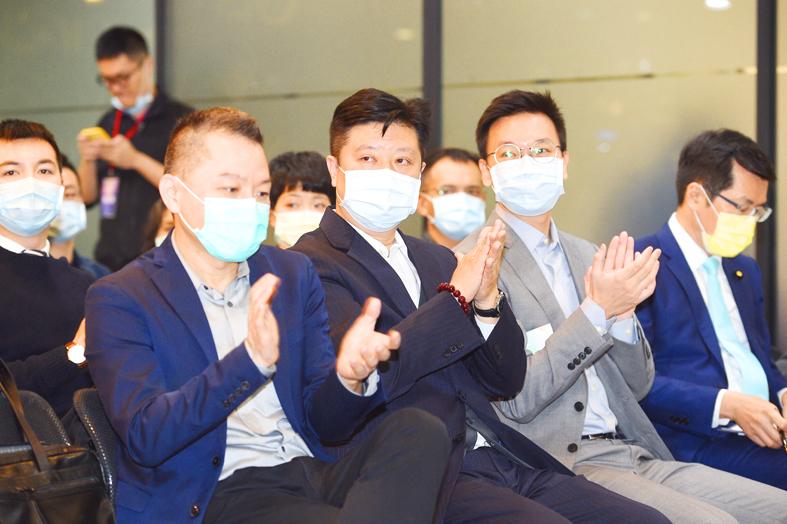A majority of the public supports the Democratic Progressive Party (DPP) government’s cross-strait policy, party officials told a forum in Taipei yesterday, adding that the nation’s security had been undermined under the previous Chinese Nationalist Party (KMT) government.
“The main reason behind the instability in Taiwan’s national security can be traced back to former president Ma Ying-jeou’s (馬英九) eight years in office. Ma’s policies permitted China to infiltrate every sector of Taiwanese society,” DPP China Affairs Department head Wu Jun-zhi (吳峻鋕) said.
“That led to a weakening of Taiwan’s political institutions and its vitality, along with over-reliance on China for economic growth. As the society was permeated by Chinese infiltration and influence, it impaired national defense and undermined the military’s resolve to defend the country,” he added.

Photo: Peter Lo, Taipei Times
“When the DPP took over the government [in 2016], the nation was facing very severe conditions,” said Wu, whose office organized the first of four planned forums on the theme of “Strengthen Taiwan, the country will be safe.”
Institute for National Policy Research executive director Kuo Yu-jen (郭育仁) said that President Tsai Ing-wen (蔡英文) had a very tough job in working to rectify Ma’s policies, as she faced four major challenges: suspension of national defense development, cessation of diplomatic and international initiatives, highly asymmetric cross-strait relations and a high level of dependence on China for economic growth.
“The DPP government has done a very good job in containing the COVID-19 pandemic. But as an island nation, we should restore international trade with other countries and regions, once vaccines become available around the world,” Kuo said.
When vaccines come online, global economic and political developments will move much faster, he added.
“After signing the RCEP [Regional Comprehensive Economic Partnership] last month, Chinese Minister of Foreign Affairs Wang Yi (王毅) immediately visited Tokyo. It was China’s tactic to use this free trade body to isolate Taiwan in global trade,” he said.
“This is a severe test for Taiwan, and we must let the US and other trading partners know China’s aims, that talks on economic links is just a facade, as China’s main political aim is to isolate Taiwan,” Kuo said.
Taipei Medical University professor Chang Kuo-cheng (張國城) cited Beijing’s strong-arm tactics to control the COVID-19 outbreak and then signed on to RCEP.
“It is clear that China will continue to expand its influence; therefore, Taiwan must strengthen its national defense, rather than placing its hope on the US coming to our aid when conflict breaks out. It is to our advantage to collaborate with the US and other countries to bolster our forces and enhance our military capability,” he said.
“Taiwanese must strengthen their minds. China has targeted Taiwan to wage a propaganda war and disinformation campaign to manipulate public opinion, working to sabotage improving Taiwan-US ties, to sow mistrust in society, while touting that China is a big powerful nation,” he said.
“We must keep a close check on this situation while promoting closer ties with the US,” he added.

Japanese footwear brand Onitsuka Tiger today issued a public apology and said it has suspended an employee amid allegations that the staff member discriminated against a Vietnamese customer at its Taipei 101 store. Posting on the social media platform Threads yesterday, a user said that an employee at the store said that “those shoes are very expensive” when her friend, who is a migrant worker from Vietnam, asked for assistance. The employee then ignored her until she asked again, to which she replied: "We don't have a size 37." The post had amassed nearly 26,000 likes and 916 comments as of this

US President Donald Trump said "it’s up to" Chinese President Xi Jinping (習近平) what China does on Taiwan, but that he would be "very unhappy" with a change in the "status quo," the New York Times said in an interview published yesterday. Xi "considers it to be a part of China, and that’s up to him what he’s going to be doing," Trump told the newspaper on Wednesday. "But I’ve expressed to him that I would be very unhappy if he did that, and I don’t think he’ll do that," he added. "I hope he doesn’t do that." Trump made the comments in

Tourism in Kenting fell to a historic low for the second consecutive year last year, impacting hotels and other local businesses that rely on a steady stream of domestic tourists, the latest data showed. A total of 2.139 million tourists visited Kenting last year, down slightly from 2.14 million in 2024, the data showed. The number of tourists who visited the national park on the Hengchun Peninsula peaked in 2015 at 8.37 million people. That number has been below 2.2 million for two years, although there was a spike in October last year due to multiple long weekends. The occupancy rate for hotels

A cold surge advisory was today issued for 18 cities and counties across Taiwan, with temperatures of below 10°C forecast during the day and into tonight, the Central Weather Administration (CWA) said. New Taipei City, Taipei, Taoyuan and Hsinchu, Miaoli and Yilan counties are expected to experience sustained temperatures of 10°C or lower, the CWA said. Temperatures are likely to temporarily drop below 10°C in most other areas, except Taitung, Pingtung, Penghu and Lienchiang (Matsu) counties, CWA data showed. The cold weather is being caused by a strong continental cold air mass, combined with radiative cooling, a process in which heat escapes from